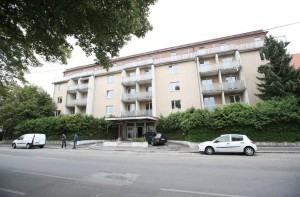Vienna hotel shows benefits of employing refugees
 A short walk from Vienna’s famous Prater parkland sits a unique hotel where the guests are not the only travellers present.
A short walk from Vienna’s famous Prater parkland sits a unique hotel where the guests are not the only travellers present.
The recently opened Magdas Hotel stands as solid, bricks-and-mortar evidence of the benefits of employing refugees.
All but five of the 25-or-so staff here, from the cooks to the receptionists to the technicians, are people who have been granted asylum by EU member Austria after fleeing war or persecution in their home countries.
“The hotel is based on a social enterprise model. We don’t want to be some cute social project,” says Klaus Schwertner of Caritas Austria, the charity which helped finance the hotel with a 1.5-million-euro ($US1.6-million) loan.
“We want to show the many untapped languages and skills that refugees bring along. We want to show that the employment ban (for asylum seekers) is neither socially nor economically reasonable,” he told wire agency AFP.
Among the hotel’s recruits – from 16 different nations and who between them speak 24 languages – is Maryam from Morocco who arrived in Austria by foot via Turkey back in 2001.
For 12 long years – the time it took the Austrian authorities to approve her asylum request – she was not allowed to work.
“My father told me, ‘Why did you leave? It will be hard, there is no paradise waiting for you’. And he was right,” Maryam says, while clearing the hotel’s breakfast area.
Even once she got her residence permit, doors remained closed for the 38-year-old. After more than a decade of unemployment, no-one wanted to hire the refugee, who speaks five languages fluently including German.
Maryam’s case is far from exceptional. The situation remains dire for the 34,000 people currently applying for asylum in Austria, and for those who have been granted the right to stay.
In common with rules throughout the European Union, while their application is being processed, they are only allowed to take on seasonal jobs. Some women end up in prostitution.
During this time they “are not allowed to earn more than 100 euros ($105) per month. Otherwise state funding for a refugee home and 40 euros worth of pocket money are at risk,” explains migration expert Susanne Binder.
“If they find private accommodation, they receive 300 euros from the government, but no additional help.”
While current laws still forbid hiring those stuck in asylum limbo, the Magdas hotel has so far been able to employ 20 refugees who have been granted residency and to give traineeships to migrants under 18.
The idea for Magdas – whose play-on-words motto is “Stay open-minded” – originated in 2012 when refugees occupied a church in central Vienna and went on hunger strike.
Their demands were simple, says Schwertner who met the protesters at the time: “They wanted a right to stay and a right to work.”
With the numbers of asylum-seekers in Europe from Syria and other hotspots rising strongly, one of the hotel’s main goals is to improve the image of refugees both in the media and with ordinary Austrians.
To do this, Magdas’s management is planning various projects as part of this bridge-building process, including dinner debates, craft workshops and art exhibitions.
The concept seems to have a lot of support: in addition to the Caritas loan, Magdas raised some 60,000 euros by attracting small donations from members of the public via crowdfunding.
The 78 rooms of the former nursing home turned into a stylish retro-urban hotel are regularly booked out. People booking online are often unaware of its special selling points.
Many of the books, plants and vintage furniture items have been donated by Viennese residents.
Old suitcases lie scattered on the floor in the lobby, a symbol that everyone is a nomad here. Luggage holders were donated by the Austrian rail company.
“I didn’t know where Austria was nor how long it would take me to get here,” says kitchen employee Segun from Nigeria, smiling broadly and trying not to spill a bowl of dry cornflakes in one hand as he gesticulates wildly.
“But I’m happy to be here, because there is peace.”
Helen Matovu-Reed
AMES Staff Writer












